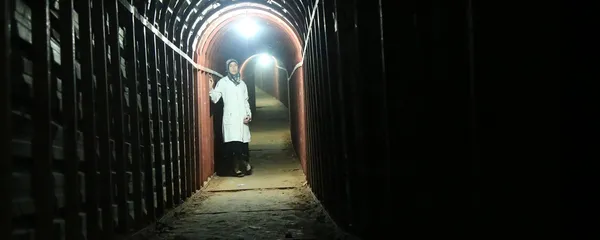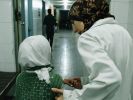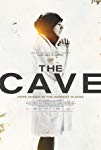Eye For Film >> Movies >> The Cave (2019) Film Review
The Cave
Reviewed by: Jennie Kermode

For as long as humans have been telling each other stories, there have been tales of people who have literally gone underground to escape violence or persecution. Over the past century and a half many of these stories have taken on a heroic dimension, fantasising about how such people might recreate all the important institutions of civilisation in their secret, twilit world. But what happens when people are forced to live that way for real? What kind of courage does it take just to survive?
Feras Fayyad's documentary follows paediatrician Amani Ballour, who, when shelling made in impossible to work safely on the surface in al Ghouta, set up one of the first underground hospitals, whose tunnels also served as bomb shelters for civilians during some of the more terrifying raids. Her work was remarkable not just on its own merits but also because of the deeply conservative nature of Syrian society. In an early scene we see her challenged by a man who insists that she ought to be at home looking after a husband and that the hospital would be better run if it had a male manager. She gently explains that she has been elected as manager twice by her colleagues. it is difficult to imagine anybody running the hospital better under the circumstances.

The film is deeply personal to Fayyad, a Syrian himself with Kurdish family connections that led to him learning early on about the horrors of chemical weapons, something that proves depressingly relevant here. He has consistently spoken of his admiration for women who managed to remain strong as the disintegrating political situation saw them increasingly targeted with abuse. Here in the hospital, in extremis, we get a vision of society as it might be more widely. Women and men work alongside one another with total commitment and respect. There just isn't time to do things any other way. What counts is skill, and the will to keep going no matter what.
That will is often pushed close to breaking point. At one time or another we see most staff members weeping, emotionally overwhelmed by what they've encountered, or shaking in fear. Not everything can be done underground. Cooking, for instance, requires better ventilation, which means staying acutely alert for the sound of Russian planes so that there's time to run for cover if necessary. In this state, any unexpected loud noise can trigger panic. Fayyad carefully balances sound so that audiences are not overwhelmed by the thunder of the shelling but still get enough of a sense of it to understand what it does to those on the ground.
If there's one thing missing here, it's an image of the city as it was before all this started. All we see are the ruins, everything covered in a layer of concrete dust. When not on duty in the hospital, Amani makes home visits to families with young children. There, poverty is compounded by those old attitudes to gender and work, which leave lone mothers and widows unable to afford adequate food or shelter for their children. Lack of vitamins is as severe a problem as lack of anaesthetic or the limited supply of antibiotics.
Every now and again, Amani's parents get in touch to tell her how much they miss her. Her plants are waiting for her, they say. They are growing big and strong. Another doctor speaks to his wife and children who are terrified when they can't check up on him, but he doesn't have much of a phone signal down in the bowels of the Earth.
A familiarity with news footage of the siege of Damascus and the surrounding area will not prepare you for what Fayyad has captured in this film, though the doctors say that's far from the worst of it. It's not just the wounds caused by bombs - it's all the little things, the day to day illnesses and injuries, including things that would be easy to treat under normal conditions but could be fatal here. in one scene, Amani tries to work out what it is that an infant girl has swallowed. In another, a deep sense of horror afflicts even the most seasoned staff when people with no obvious injuries begin dropping dead all around them, lips and cheeks turning grey-blue with cyanosis. There are some monstrous weapons against which it is impossible to defend.
In quiet moments, we hear about the things the staff dream of, the thoughts that keep them going. A face lift - the chance to look beautiful (Amani already has a striking, serene beauty of which she seems quite unaware). Mascara. Chocolate. Pizza with extra cheese. There is laughter in these moments. We see the deep bonds that have formed within the team, the love that makes them resilient.
There is still no clear picture of how many people died in al Ghouta during this period, but without the Cave, it would have been thousands more. Fayyad hopes that his film will keep the crisis in Syria on viewers' minds and encourage them to pressure governments to help. After watching this, you certainly won't be able to forget it.
Reviewed on: 06 Dec 2019

















